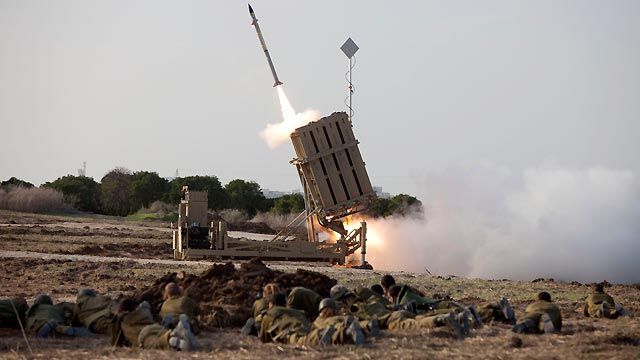
Israel may be targeting more than Hamas as it escalates its bombing campaign in Gaza and tries to eliminate the threat of increasingly lethal stockpiled rockets. Israel's real target may be Iran.
The last 6 days of fighting may in fact be a prelude to what looks like an increasingly inevitable military strike against Iran's nuclear program.
The conventional wisdom has long been that Iran, if attacked by Israel, would strike back using proxy forces such as Hamas in Gaza and Hezbollah in Lebanon, terror groups the Iranians have been arming with longer and longer missiles in recent years.
Those missiles, which include Fajr 5 rockets with a range of 45 miles, can reach both Tel Aviv and Jerusalem from the Gaza Strip.
�Our problem is not our border with Gaza,� Israel�s Ambassador the United States Michael Oren told Fox News on Monday. �Among the rockets being fired at us are the Fajr 5 rockets, which come directly from Iran. We know that Hamas terrorists have trained with the Iranians -- there's a strong connection.�
In the past year, Hamas with Iran�s help has smuggled component parts for these longer-range rockets through tunnels from Egypt's Sinai desert into Gaza. Those tunnels have long existed, but prior to the Arab Spring movement, then-President Hosni Mubarak of Egypt had his security forces monitor to some degree the caliber of weapons that entered Gaza.
Mubarak allowed some weapons into Gaza, but now that Egypt has a new president the flow has increased, as well as the lethality of the weapons. Yet in recent days, Iran has denied providing weapons to Hamas.
The Israeli military refers to the Fajr 5 rockets, with their longer range and 385-pound payload, as game changers.
�They are Iranian-made, and about 100 of them were imported into Gaza via Sudan, it appears,� Jonathan Schanzer, from the Foundation for Defense of Democracies, said. �When the Israelis learned of the existence of these rockets, all it took was one provocation on the part of Hamas for Israel to go in and wipe out those rockets and those launchers.�
The provocation came on Wednesday, when Hamas fired a guided anti-tank rocket at an Israeli military jeep inside Israel.
�There's no country on earth that would tolerate missiles raining down on its citizens from outside its borders,� President Obama said on Sunday on a visit to Thailand.
Now 30,000 Israeli reserve forces have gathered on the border with Gaza and will enter the Gaza Strip if Israeli air strikes cannot destroy all of these longer-range rockets and their launch pads.
"They'll go into Gaza if they feel they need to, to eliminate the remainder of the missiles, a lot of which are supplied to Hamas by Iran,� Sen. Joe Leiberman, I-Conn., said on "Fox News Sunday."
The joint U.S.-Israeli "Iron Dome" anti-missile shield has shot down more than 300 incoming rockets from Gaza since Wednesday, according to figures provided by the Israeli military.
In March 2010, the Obama administration announced that it would provide $205 million to help Israel purchase up to 10 Iron Dome batteries. The House Armed Services Committee has authorized up to $680 million more to be spent on Iron Dome procurement for Israel over the next three years to protect Israeli cities.
Pentagon officials had hoped that the presence of a strong missile defense shield would give the Israelis some degree of security and deter the Israelis from striking Iran prematurely or unilaterally. Now it appears as if Israel is removing its most immediate rocket threat in the short term and testing Iran�s nearest proxy and regional alliances before deciding whether Iran�s nuclear program can be dealt a military blow.
The Iran Project is not responsible for the content of quoted articles.











